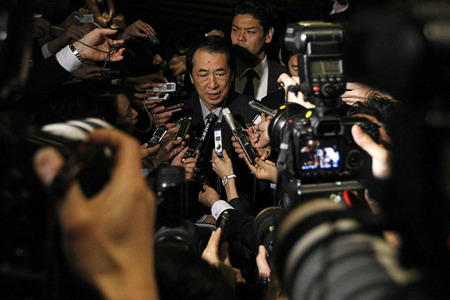Asia-Pacific
New Japanese finmin calls for weaker yen
(Agencies)
Updated: 2010-01-07 20:14
 |
Large Medium Small |
|
|
TOKYO: Japan's new finance minister called for a weaker yen on Thursday and said he would work with the Bank of Japan to achieve an appropriate level, prompting a sharp slide in the currency against the dollar.
In his first press conference as finance minister, Naoto Kan also signalled he would maintain pressure on the central bank to do more to lift the frail economy, which the government fears could slip back into recession as deflation hurts demand.
He also lived up to some expectations that he would not be as fiscally restrained as his predecessor by saying he would be open to spending more in the future if the economy weakens. He had not felt bound by fiscal austerity when the cabinet last month agreed on a budget for 2010/11, he said.
"Many businesses say it is appropriate for the dollar to be around 95 yen for trade, so we must work with the Bank of Japan to bring it to appropriate levels taking into account the various effects currencies may have on the Japanese economy," Kan, who is also deputy prime minister, said.
"At the moment, (dollar/yen) has largely corrected to a weak yen compared with the time when the so-called Dubai shock occurred. It would be nice if the yen weakened a bit more," he said.
Kan, 63, formerly National Strategy Minister, was named finance minister on Wednesday, replacing 77-year-old Hirohisa Fujii, who stepped down for health reasons.
His job will be to steer the world's second-biggest economy back to health after it suffered its worst recession in decades during the global financial crisis.
Although growing again, the government fears a long bout of deflation, which the central bank has forecast will last at least another three years, will undermine the nascent recovery.
"Change of Tone"
The yen slid to 92.87 per dollar after Kan's comments from around 92.20 on trading platform EBS. The yen has come off a 14-year high of 84.82 per dollar in late November but Kan's comments reinforced expectations he would be more inclined to act against excessive yen rises.
Japan's key exports industry is slowing emerging from Japan's worst post-war recession so a weaker yen would be welcomed. Major exporters, including Honda Motor Co, have complained about the high levels of the yen.
"It clearly would be helpful if the yen weakened a little bit so the Japanese can share in some of the robust growth that some of its trade competitors like South Korea and Taiwan have enjoyed," said Glenn Maguire, Asia chief economist at Societe Generale in Hong Kong.
Maguire, like other analysts, did not foresee that Japan would return to currency intervention -- last seen in 2004 -- but said the finance ministry's tolerance of a high yen would change under Kan.
"There is clearly a change of tone that reflects the deterioration of the economic environment since the DPJ was swept to power," Maguire said, referring to the ruling Democratic Party of Japan, which won a national election last August.











